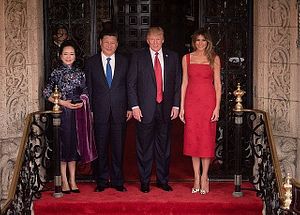At 12:01 a.m. on July 6 in Washington — noon in Beijing — the United States began imposing tariffs on $34 billion in Chinese goods. Minutes later, China’s Commerce Ministry issued a statement, saying that “the United States has violated World Trade Organization rules and waged the biggest trade war ever in economic history.”
“Such tariffs are typical trade bullying, and this action threatens global supply chains and value chains, stalls the global economic recovery, triggers global market turmoil, and will hurt more innocent multinational companies, enterprises, and consumers,” the statement said.
The statement added: “China had promised not to fire the first shot, but the country is forced to strike back to safeguard core national interests and the interests of its people … We will work with other countries around the world to jointly safeguard free trade and the multilateral system.”
Despite those strong remarks, China still left room for a potential compromise in the future.
The statement reiterated that China “will unswervingly deepen reform, expand opening up, protect entrepreneurship, strengthen property rights protection, and create a good business environment for global companies in China ” — an apparent response to the Trump administration’s complaints.
Hours after the statement was released, the General Administration of Customs of China publicly announced that 25 percent import tariffs had been imposed on equal value of American goods, ranging from soybeans to pork.
U.S. President Donald Trump had threatened earlier that he would impose tariffs on an additional $200 billion in Chinese imports if Beijing retaliated with countermeasures. Given that Beijing has kept its word to retaliate, the ball is in Trump’s court again now.
While both governments were fighting fiercely, netizens in both China and the United States focused their attention on a cargo ship, Peak Pegasus. This ship, carrying tons of U.S. soybeans, had been racing against the clock across the sea, trying to arrive in Dalian port before the tariff war started. Unfortunately, according to Chinese media, the ship failed to make it.
Peak Pegasus, together with numerous other trade companies and businessmen, will become the victims of this trade war.
On July 2, the U.S. Chamber of Commerce issued a study outlining the state-by-state impact of retaliatory tariffs from China and other countries. According to the study, Alabama, Michigan, Pennsylvania, South Carolina, Texas, and Wisconsin will suffer the most in the United States.
“Tariffs are beginning to take a toll on American businesses, workers, farmers, and consumers as overseas markets close to American-made products and prices increase here at home,” U.S. Chamber of Commerce President and CEO Thomas J. Donohue said. “Tariffs are simply taxes that raise prices for everyone. Tariffs that beget tariffs that beget more tariffs only lead to a trade war that will cost American jobs and economic growth.”

































